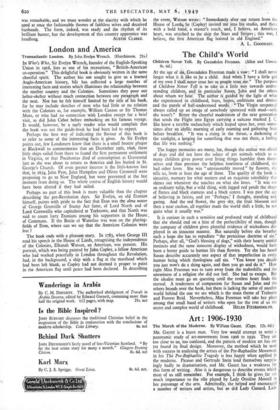• The Child's World
Children Never Tell. By Gwendolen Freeman. (Allen and Unwin- 8s. 6d.)
AT the age of six, Gwendolen Freeman made a vow : " I shall never forget what it is like to be a child. And when have a little girt of my own I Shall never treat her as .people treat4ie." The purpose of Children Never Tell is to take us a little way towards under- standing children, and in particular Susan, John and the others about whom we-hear. The author is guided by the light of what she experienced in childhood, fears, hopes, ambitions and desires and the puzzle of half-understood words. - "The Virgin unspotted always called up an image of somebody spattered with mud—only she wasn't." Better the cheerful modernism of the next generation that sends the. Flight into Egypt carrying a suitcase marked J. C. She knew a terrible melancholy which leaped upon her, even some- times after an idyllic morning of early roaming and gathering fruit before breakfast. " It was a rising in the throat,: a darkening of the sunlight,-.a longing for something that was not there, , a feeling that life was nothing."
• .. . . • ,
The happy memories are many, for, though the author was afraid of dogs and did not have the solace of pet animals which to so many children gives power over living things humbler than them- selves and thus prevents the helpless loneliness of childhood, she had other loves. She was " unreasonably moved " .by flowers, she tells us, from at least the age of three. The quality of the book is sincerity, memory for what matters and an exquisite sensibility that shines out whenever she touches on what she loves. " It was not an ordinary' tulip; tut a 'wild thing, with jagged red petals the shape of flames and black stamens and a black centre. I' was past the age of believing in fairies, and yet ' Perhaps,' I thought, standing and gazing. And the red- flower the grey- sky, the fruit blossom and then a near cuckoo, all together made the world shift a little, be not quite what it usually was."
It is curious in such a sensitive and profound study of childho90 that she should end on a hint of the perfectibility of man, though the company of children gives plentiful evidence of wickedness dis- played in an. innocent manner. But naturally before she breathes such a hope she has to repudiate " the pernicious doctrine of sin." Perhaps, after all, " God's blessing of dogs," with their hearty animal instincts and the same innocent display of wickedness, would hay'e been a better guide to human life than flowers. Yet she has heard Susan describe accurately one aspect of that imperfection in every human being which' theologians call sin. " You know you decide you just won't do a thing again, and then you go and do it." Hew right Miss Freeman was to turn away from the makeshifts and the uneasiness of a religion she did not feel. She had to escape. But the idealist must go on questing until the restless heart finds the eternal. A tenderness of compassion for Susan and John and the others broods over the book, but there is lacking the sense of another world behind the one we see which is the main theme of Traheine and Forrest Reid. Nevertheless,. Miss Freeman will take her place among that small band of writers who open for the rest of us the






































 Previous page
Previous page